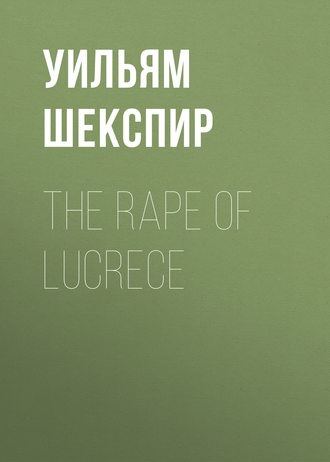полная версия

Уильям Шекспир
The Rape of Lucrece
If they surcease to be that should survive.
Shall rotten death make conquest of the stronger,
And leave the faltering feeble souls alive?
The old bees die, the young possess their hive:
Then live, sweet Lucrece, live again, and see
Thy father die, and not thy father thee!'
By this starts Collatine as from a dream,
And bids Lucretius give his sorrow place;
And then in key-cold Lucrece' bleeding stream
He falls, and bathes the pale fear in his face,
And counterfeits to die with her a space;
Till manly shame bids him possess his breath,
And live, to be revenged on her death.
The deep vexation of his inward soul
Hath serv'd a dumb arrest upon his tongue;
Who, mad that sorrow should his use control,
Or keep him from heart-easing words so long,
Begins to talk; but through his lips do throng
Weak words, so thick come in his poor heart's aid,
That no man could distinguish what he said.
Yet sometime 'Tarquin' was pronounced plain,
But through his teeth, as if the name he tore.
This windy tempest, till it blow up rain,
Held back his sorrow's tide, to make it more;
At last it rains, and busy winds give o'er:
Then son and father weep with equal strife,
Who should weep most, for daughter or for wife.
The one doth call her his, the other his,
Yet neither may possess the claim they lay,
The father says 'She's mine,' 'O, mine she is,'
Replies her husband: 'do not take away
My sorrow's interest; let no mourner say
He weeps for her, for she was only mine,
And only must be wail'd by Collatine.'
'O,' quoth Lucretius, 'I did give that life
Which she too early and too late hath spill'd.'
'Woe, woe,' quoth Collatine, 'she was my wife,
I owed her, and 'tis mine that she hath kill'd.'
'My daughter' and 'my wife' with clamours fill'd
The dispers'd air, who, holding Lucrece' life,
Answer'd their cries, 'My daughter!' and 'My wife!'
Brutus, who pluck'd the knife from Lucrece' side,
Seeing such emulation in their woe,
Began to clothe his wit in state and pride,
Burying in Lucrece' wound his folly's show.
He with the Romans was esteemed so
As silly-jeering idiots are with kings,
For sportive words, and uttering foolish things:
But now he throws that shallow habit by,
Wherein deep policy did him disguise;
And arm'd his long-hid wits advisedly,
To check the tears in Collatinus' eyes.
'Thou wronged lord of Rome,' quoth he, 'arise;
Let my unsounded self, suppos'd a fool,
Now set thy long-experienc'd wit to school.
'Why, Collatine, is woe the cure for woe?
Do wounds help wounds, or grief help grievous deeds?
Is it revenge to give thyself a blow,
For his foul act by whom thy fair wife bleeds?
Such childish humour from weak minds proceeds:
Thy wretched wife mistook the matter so,
To slay herself, that should have slain her foe.
'Courageous Roman, do not steep thy heart
In such relenting dew of lamentations,
But kneel with me, and help to bear thy part,
To rouse our Roman gods with invocations,
That they will suffer these abominations,
(Since Rome herself in them doth stand disgrac'd,)
By our strong arms from forth her fair streets chas'd.
'Now, by the Capitol that we adore,
And by this chaste blood so unjustly stain'd,
By heaven's fair sun that breeds the fat earth's store,
By all our country rights in Rome maintain'd,
And by chaste Lucrece' soul that late complain'd
Her wrongs to us, and by this bloody knife,
We will revenge the death of this true wife.'
This said, he struck his hand upon his breast,
And kiss'd the fatal knife, to end his vow;
And to his protestation urg'd the rest,
Who, wondering at him, did his words allow;
Then jointly to the ground their knees they bow;
And that deep vow, which Brutus made before,
He doth again repeat, and that they swore.
When they had sworn to this advised doom,
They did conclude to bear dead Lucrece thence;
To show her bleeding body thorough Rome,
And so to publish Tarquin's foul offence:
Which being done with speedy diligence,
The Romans plausibly did give consent
To Tarquin's everlasting banishment.






